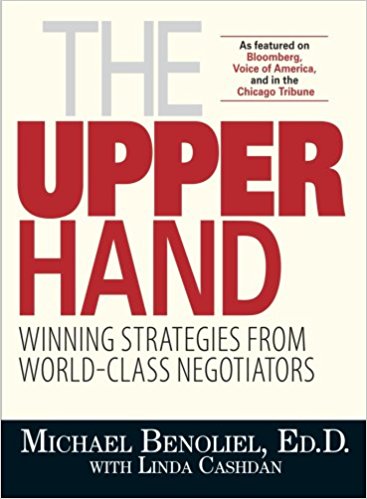The Upper Hand Summary

5 min read ⌚
 Winning Strategies from World-Class Negotiators
Winning Strategies from World-Class Negotiators
Most people undervalue the negotiator’s job. However, to be a good negotiator, you have to know the stakes at hand. You have to be able to read people, understand them and their needs. You need to be an excellent communicator that not only states his stance but also builds relationships.
Who Should Read “The Upper Hand”? And Why?
During our lifetimes, all of us have encountered or will face situations in which we need to negotiate. Authors Benoliel and Cashdan have written a book about negotiating, which they filled with valuable advice, coming from top negotiators they interviewed.
Since the input comes from people who excelled at negotiating, the Upper Hand is in no doubt realistic and applicable to different possible situations suitable for pretty much everyone.
About Michael Benoliel & Linda Cashdan
 Michael Benoliel is the founder of the Center for Negotiation, which he now manages. He is a certified mediator and has helped with negotiations on several occasions. The organizations he helped are based in Africa, the Middle East, and the United States.
Michael Benoliel is the founder of the Center for Negotiation, which he now manages. He is a certified mediator and has helped with negotiations on several occasions. The organizations he helped are based in Africa, the Middle East, and the United States.
Linda Cashdan is a published freelance writer. She has worked for Voice of America for more than three decades.
“The Upper Hand Summary”
You need to follow general rules and principle, and at the same time notice the uniqueness of each situation, to which you should adjust.
Negotiators are like architects. Architects create their designs according to the vision and knowledge they have about the building’s function and context. Negotiators do the same. The difference is that architectural structures are static, and negotiations are a child of dynamics.
They regularly change and transform under the touch of new information. However, although dynamics is its primary trait, a few standard criteria apply to all negotiations: the size of the team, technical knowledge, social dynamics, political considerations, public relations and strategic vision.
In each meditation, you will find yourself immersed in some standard issues. Those issues are connected to organizing the agenda – the location is the easiest and timing the most complicated issue.
Another thing to note is that you are always sitting on the negotiator’s table as an individual. It does not matter whom you are negotiating for: an enterprise, a country or some other type of organization – you are the one that carries the whole burden.
Treat people with respect, even if you deny their offers, do that respectfully and never call them unreasonable. Build a relationship with the other side, by trying to get to know them primarily as people and not only as opponents. By doing this, you will create a bondage and present yourself as an honorable and credible person.
Consequently, your “opponents” will never take your opinion lightly. Furthermore, be sure to create trust. You can create the feeling of trust by keeping your word, being straightforward and sharing as much information as you can.
It all comes down to your actions. You may find yourself in a situation when you will need to negotiate with the same people again in the future. If you have a good interpersonal relationship, your future negotiations will be less stressful and more enjoyable.
Most negotiators are aware of what they want to get out of the negotiation and what kind of deal they hope for. Yet, not all of them know how to make such a deal tempting to the other side. It is the reason why many negotiations crack right at the point where both sides need to reach an agreement.
To stay away from such situations, you have to look at things from everyone’s perspective. If you understand what their objectives are and reasons behind them, you will find a better way to present your opinion in a way that brings mutual benefit. Lastly, try to be fair and always opt for a win-win situation.
Key Lessons from “The Upper Hand”
1. Prepare
2. Know your Objectives
3. Think Strategically
Prepare
To be successful, you have to prepare long before the moment you sit on the negotiator’s table comes. Research your opposing side and understand the complete context of the situation and not just the areas which are under negotiation.
Keep flexible, and continue gathering information. Some pieces of information will reach you later than others, so do not freeze your understanding of the circumstances. Instead, evolve along with the information you have. Furthermore, prepare the physical aspects of your negotiation.
Pick the place and the time that suits your needs and allows you to present yourself as best as you can.
Know Your Objectives
Before you start the negotiation, it is crucial to set the objectives. Know your criteria and how much you are willing to lose or to spend. Know the essential things you need to have, and the elements that you wish to have, but are not that crucial.
In the end, if you do not reach a deal that meets your bottom line criteria, be ready to walk away.
Think Strategically
Do not just think about winning each point of the negotiation, go further than that. Be tactical and focus on the big picture. Be ready to give up something small, to get something big later in the negotiation process. Make sure that you are sure of your vision and the reasons behind it.
If you are not, you will never be able to “pack” the offer in a package that is attractive to every side.
Like this summary? We’d Like to invite you to download our free 12 min app, for more amazing summaries and audiobooks.
“The Upper Hand” Quotes
Negotiating is an acquired competency that requires both training and a complex set of intelligence, attitudes, and skills. Share on X Trust is the confidence that the other side’s intentions and behaviors are what they say they are and what we expect them to be. Share on X Having a logical coherence in your positions and goals is essential to building trust. Share on X Negotiators create the future. Whether they resolve a protracted conflict or negotiate a successful business deal, they create a new and hopefully better reality. Share on X Strategic negotiators understand the complexity of all elements of the negotiation structure and process, and they artfully orchestrate the way those elements interact. Share on XOur Critical Review
In a few words, it can be described as a clear and straightforward book that presents tactics for becoming a great negotiator. Who do we recommend it for? Well, on the one hand, people that just start out as negotiators can read it to get the hang of the practice.
On the other hand, it can also benefit more experienced negotiators that want to develop their skills further. So, although it is primarily focused on business situations, we recommend this engaging book for everyone who sits on the negotiator’s table in some area of their lives.








